If you live in the country, you probably get your water from a drilled well in your basement or backyard. In most cases, the “well” looks like a steel or plastic pipe about 4″ to 5″ diameter that projects a few inches above ground and has a steel cap on it.
Depending on the depth of the well, there’s either an above ground pump (often called a jet pump) or “deep well” submersible electric pump hidden in the well. Need to know more? There’s an excellent article on how electric well pumps work on the Popular Mechanics website.
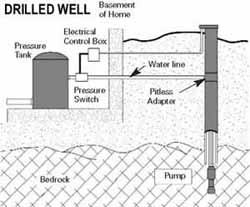
Either way, a power failure can leave you high and dry. Because well pump systems incorporate a storage tank (sometimes called a pressure tank), you may have a access to 20-30 gallons even without electricity. But, it’s astonishing how fast it runs out. And, how much you miss access to fresh water after it’s gone!
It’s doubly frustrating, because in many cases you can actually see the water in the bottom of the well. It’s just too far away to reach! Fortunately, we have two ways to solve the problem!
Low cost well bucket
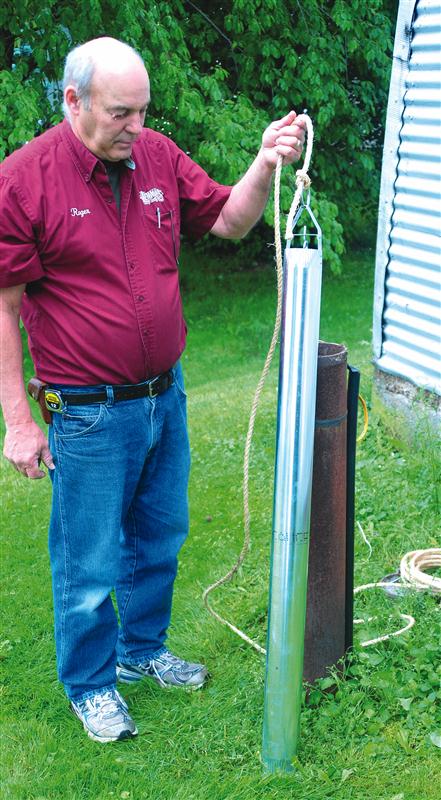
It’s just 3 1/2 inches in diameter. That narrow profile means it will fit into many drilled wells. (Make sure you confirm that it will work in your installation before a power failure hits!)
It’s a pretty ingenious design, if I do say so myself. There’s a valve in the bottom that automatically opens as soon as the bucket hits the water, allowing it to fill from the bottom up. It holds nearly two gallons, and the rubber gasketed valve automatically closes and seals to hold the water in as soon as you start drawing the bucket back up.
Convenient, durable hand pump
We also have a tough, light pump made from stainless steel and thermoplastic. Because it pumps up to 10 gallons per minute, it’s your most convenient option. It comes in two versions, one for shallow wells and one for deep wells.
What makes it such a perfect solution for emergency use? It’s light and easy to install. It works in many drilled wells (if the casing is more than 6″ diameter). It’s tough, durable and reliable.
The shallow well version works if the water is within about 20 feet. All you need to do is add enough 2″ diameter PVC pipe (available from any hardware or plumbing supply store) to reach the water. You can tell how far it is to the water by dropping a weighted string down into the well.
Like any shallow well pump, it may need priming the first time you use it. “Priming” means pouring water into the pump to make it wet. If you’ve used all the water in your pressure tank, you may be able to use melted ice or water from the tank on the back of your toilet. (It doesn’t take very much.)
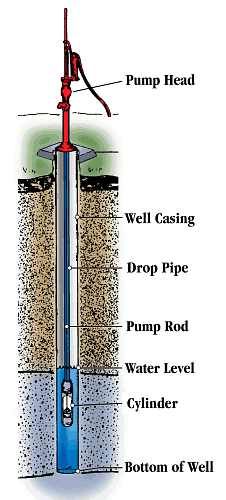 The deep well pump uses a “cylinder” that does all the work. The “pump” (sometimes called a pump head) is nothing more than a hollow housing. Because the cylinder is installed under water it stays wet all the time. Therefore, deep well pumps never need primed. For this reason, people often use a deep well pump even on shallow wells.
The deep well pump uses a “cylinder” that does all the work. The “pump” (sometimes called a pump head) is nothing more than a hollow housing. Because the cylinder is installed under water it stays wet all the time. Therefore, deep well pumps never need primed. For this reason, people often use a deep well pump even on shallow wells.
The two components are connected by equal lengths of 2″ PVC pipe and 1/2″ PVC pipe. The 2″ pipe, often called a “drop pipe,” is the conduit through which the water travels. The 1/2″ pipe acts as the rod that transmits the pumping action from the pump to the cylinder.
You can find full details on how deep well pumps work by clicking here.
At Lehman’s, our goal is to provide you with more than just the supplies you need to live without electricity. We also want to provide you with the knowledge you need to choose the right items and use them correctly. That’s why we train, test and certify our staff to answer your water pumping questions.
Need help to solve a non-electric pump problem? Give us a call! You can see our full line of pump products by clicking here. You can find detailed articles about hand pumping and many other non-electric challenges by clicking here. We’ll do our best to help you!
![]()
Galen Lehman, President, Lehman’s

Click here to join
me on Facebook!
NOTE: The home’s well is your source of drinking water. Make sure that everything you put in the well is clean and sterile. Do not allow contaminants to enter while the well cap is off. Don’t leave the well cap off for long periods of time.
PS – My goal with this article was to provide complete and clear information on emergency non-electric water pumping. Did I miss anything? Please let me know if I can make the article better.


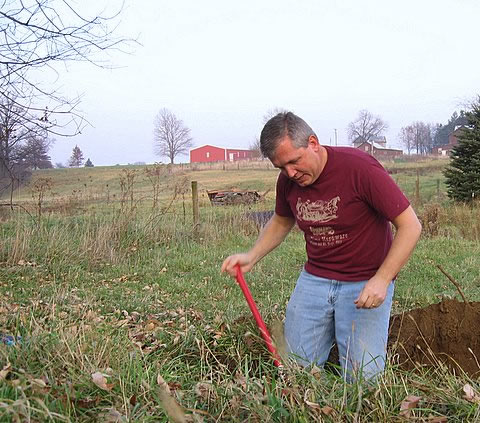



















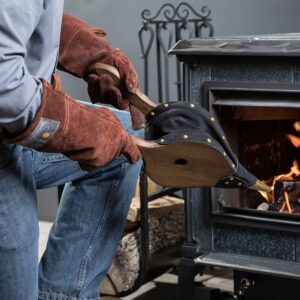








Thank you for this brilliant article. I have always wondered about this, and you’ve given me all the details I need to have an intelligent understanding of it before I hire a professional to install this for me.
Thank you for your feedback, Christy!
Im told y underground pump wiring burned out .I need an entire new pump n tank..$5700.
200′ well w4″ casing…
Can I use this idea to get water up until I can fix the problem..
The tank is full of water but how do I get to it
Hi Lorna! Please give us a call at 800-438-5346 and we will be glad to have one of our well pump experts talk to you.
Our well is 560 ft. Deep. Will your deep well pump work for us?
Hi Alesia! We understand you have a deep well you are looking for a pump for. If you need help installing a well pump, there are specs to consider on what would work for your well. It would be best to call in to speak to a pump specialist. Even though your well may be over 500′ deep, that doesn’t mean you would have to have a pipe go down that far to pump water. It is dependent on their static water level. Please give us a call at 800-438-5346.